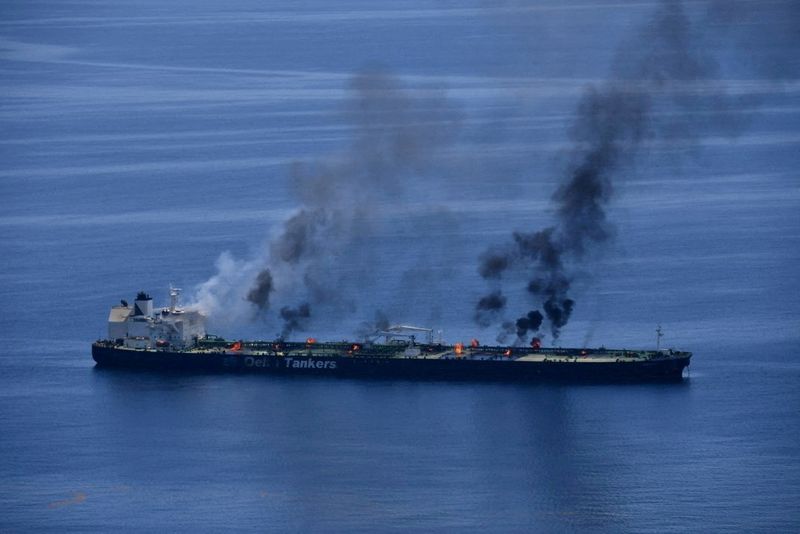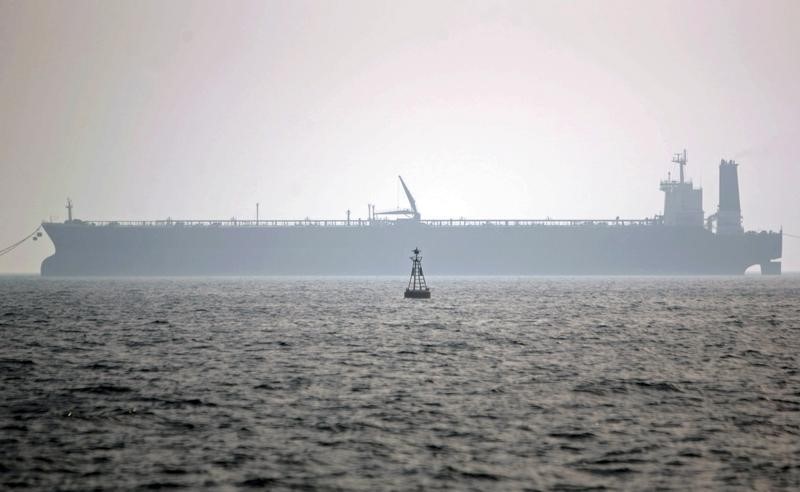By Jonathan Saul and Mohammed Ghobari
LONDON/ADEN (Reuters) - The cost of insurance for ships sailing through the Red Sea has nearly doubled after Yemen's Houthis attacked a tanker that appears to be leaking oil, with environmental fears growing for trade route, industry sources said on Wednesday.
Iran-aligned Houthi militants first launched aerial drone and missile strikes on the waterway in November in what they say is solidarity with Palestinians in Gaza. In over 70 attacks, they have sunk two vessels, seized another and killed at least three seafarers.
In the latest escalation, the Greek-flagged Sounion tanker was attacked last week by multiple projectiles and appears to be leaking oil, the Pentagon said on Tuesday.
A third party had tried to send two tugs to help salvage the Sounion, but the Houthis threatened to attack them, the Pentagon added.
Insurance industry sources, speaking on condition of anonymity, said on Wednesday additional war risk premiums, paid when vessels sail through the Red Sea, were quoted up to 0.75% of the vessel from 0.4% before the attack, although they were higher at 1% in February according to industry assessements of levels of risk.
The latest upsurge in cost can add up to hundreds of thousands of dollars for a voyage through region, although rates for Chinese-owned vessels have been up to 50% lower since February due to less risk of being targets, sources added.
One industry source said some underwriters were currently not providing cover through the region because of the potential risk of the tanker sinking.
An official with the European Union's Aspides naval mission cited a letter sent on Aug. 28 to maritime rescue coordination centres, saying it was assessing the "feasibility of protective measures" such as towing the Sounion.
"This situation poses a serious and imminent threat of regional pollution, with coastal states at the highest risk," the letter said.
A MILLION BARRELS OF CRUDE AND FIRES
A maritime security source said fires were burning onboard the tanker on Wednesday, which was carrying a cargo of 1 million barrels of crude oil.
"Delta Tankers is doing everything it can to move the vessel (and cargo)," Sounion's manager told Reuters separately.
"For security reasons, we are not in a position to comment further."
The Houthis said they attacked the tanker in part because Delta Tankers violated its ban on "entry to the ports of occupied Palestine," Houthi military spokesman Yahya Saree had said in a televised speech.
A Houthi source also told Reuters on Wednesday that the vessel was burning, adding that as a consequence there would not be a leak or any pollution into the sea.
While the crew had been evacuated, the Houthis "appear determined to sink the ship and its cargo into the sea," U.S. State Department spokesperson Matthew Miller said on Aug. 24.
The Sounion was the third vessel operated by Athens-based Delta Tankers to be attacked in the Red Sea this month. The attack caused a fire onboard, which the crew extinguished, Delta Tankers said in an earlier statement.

A major oil spill would devastate fishing communities on Yemen's Red Sea coast with half a million Yemenis working in that industry, the United Nations said in a report last year.
"Whole communities would be exposed to life-threatening toxins," the U.N. said.
